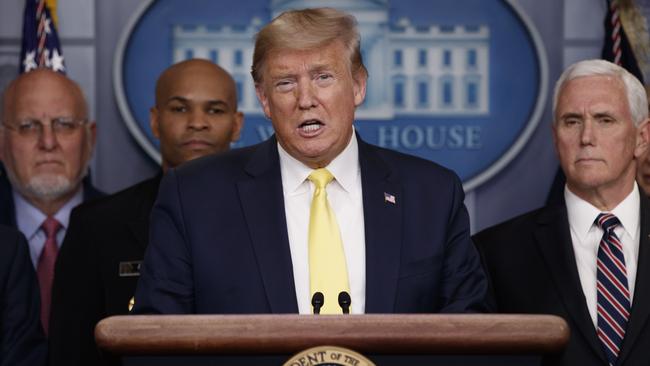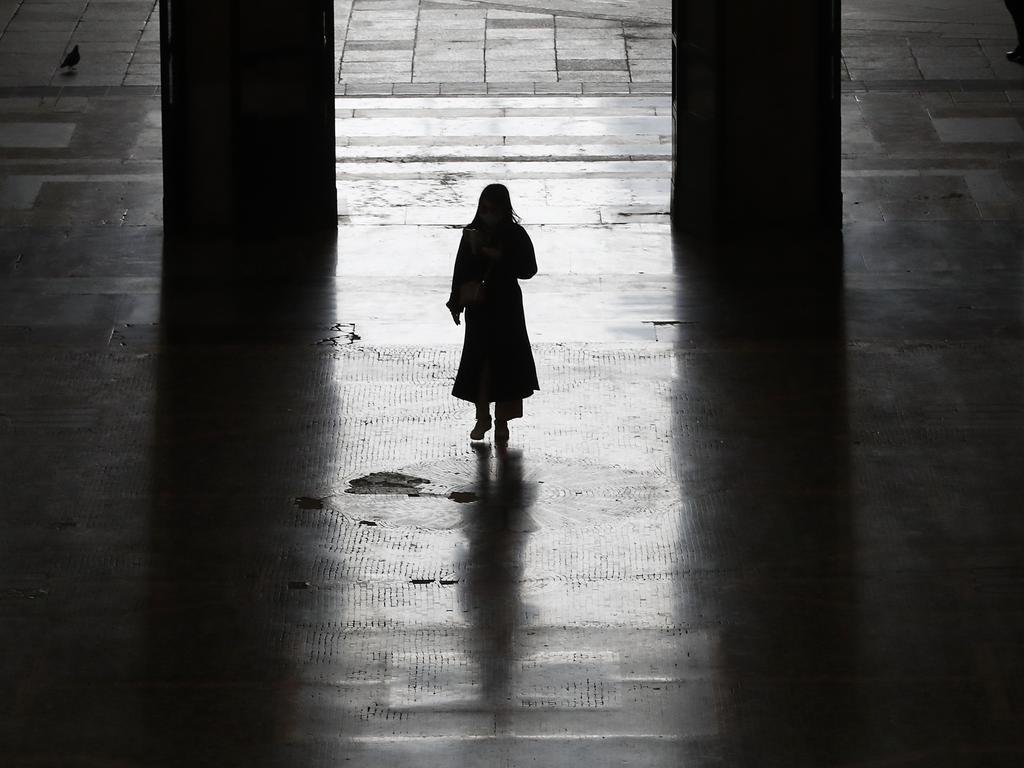Donald Trump flags ‘major’ steps to ease coronavirus fallout
The US President is set to unveil measures to ease the economic pain, with loans for small businesses also on the cards.

US President Donald Trump says the administration will discuss with Congress several measures to ease the economic pain inflicted by the coronavirus, including a possible payroll-tax cut and help for hourly wage earners.
Mr Trump said administration officials were planning to meet with congressional Republicans about the proposals on Tuesday. He said he would hold a news conference Tuesday afternoon to lay out the proposals in more detail. “They will be major,” he said.
“We’re also going to be talking about hourly wage earners getting help so they can be in a position where they’re not ever going to miss a paycheck,” the president said to reporters in a White House meeting on Monday evening, adding administration was considering “creating loans for small businesses.”
Top Republican senators threw cold water on the possibility of quickly moving forward with either a broadbased stimulus package or narrower measures, cautioning that it was too early to assess the economic damage from the outbreak.
“Let’s see where we are in a month from now or three weeks from now. It’s just too early, I think people need to stay calm as much as they can,” said Senator Richard Shelby, the chairman of the Senate Appropriations Committee, said on Monday.
Mr Shelby said no one from the administration had been in touch with him about a possible stimulus package and that he would review any White House proposal.
“We don’t have a time frame because we are still assessing risk,” said Senator Chuck Grassley, chairman of the Senate Finance Committee.
White House economic adviser Lawrence Kudlow and Treasury Secretary Steven Mnuchin are scheduled to meet with Senate Republicans at their weekly policy lunch on Tuesday to discuss the economy and the coronavirus, an administration official said.
The viral epidemic reached a new stage globally on Monday, with confirmed cases outside China tripling over the past week and the whole of Italy under lockdown. The new coronavirus is now close to becoming a pandemic, the World Health Organisation said, given its spread to more than 100 countries. In the US, the number of cases grew to 603, with 22 deaths.
Global share prices took a beating, triggering a 15-minute halt in trading in New York and increasing pressure for action to stem economic fallout from the virus. The Dow Jones Industrial Average dropped 2,014 points, or 7.8 per cent, to close at 23,851.01. The yield on the 10-year Treasury, which moves inversely to bond prices, dropped to 0.501 per cent as investors sought a haven in government debt.
Mr Trump blamed stockmarket volatility on the oil dispute between Saudi Arabia and Russia. In a tweet, he said seasonal flu kills tens of thousands of Americans. “Nothing is shut down, life & the economy go on,” he wrote. “At this moment there are 546 confirmed cases of coronavirus, with 22 deaths. Think about that!”
So last year 37,000 Americans died from the common Flu. It averages between 27,000 and 70,000 per year. Nothing is shut down, life & the economy go on. At this moment there are 546 confirmed cases of CoronaVirus, with 22 deaths. Think about that!
— Donald J. Trump (@realDonaldTrump) March 9, 2020
Other administration officials have been less sanguine.
“Make no mistake, this is a very serious health problem,” Health and Human Services Secretary Alex Azar said during an interview Monday on Fox News. “Nobody is trying to minimise that. It’s a very serious public health threat to the people of the United States.” The White House invited Wall Street executives to a Wednesday meeting to discuss the effects of the coronavirus on the economy, according to another administration official. On Friday, Mr Kudlow said possible fiscal measures included deferring taxes for the industries hardest hit by the virus — primarily hospitality and travel, an administration official said.
US Vice President Mike Pence, who heads the White House’s coronavirus task force, met in Florida Saturday with cruise industry officials. Mr Pence and other task force members were planning to meet with healthcare industry officials on Tuesday.
House Speaker Nancy Pelosi and Senate Minority Leader Chuck Schumer over the weekend outlined a series of measures including paid sick leave and expanded nutrition assistance, especially if school lunch programs need to close. They didn’t call for broader fiscal stimulus.
Mr Trump last week signed an $8.3 billion emergency spending bill to combat the coronavirus, funding efforts to develop a vaccine and assisting local and state responses. But Mr Trump and White House officials have said they don’t see an immediate need to craft a broader fiscal-policy response because the economy has been faring well.
Instead, Mr Trump has called on the Federal Reserve to do more to protect the US economy, renewing pressure he has put on the central bank during previous bouts of financial-market volatility. “We have a Fed that is not exactly proactive,” he said at the White House Friday.
Fed officials last week announced an emergency cut of half a percentage point to their benchmark federal-funds rate, lowering it to a range between 1 per cent and 1.25 per cent. Markets expect another large cut at the central bank’s March 17-18 policy meeting, but with rates already close to zero, the Fed has limited room to cut further.
On Monday, the New York Fed said it would boost the amount of short-term lending it conducts on a daily and biweekly basis to satisfy rising demand from financial institutions and avoid further strains as US banks and businesses prepare for greater disruptions from the coronavirus epidemic.
The step was designed to ensure that the supply of bank deposits held at the Fed, called reserves, “remains ample and to mitigate the risk of money market pressures that could adversely affect policy implementation,” the New York Fed said.
Meanwhile, a group of state and federal financial regulators, including the Fed and the Consumer Financial Protection Bureau, called on banks to be flexible with customers struggling to make payments on debt such as mortgages and other loans.
Economists and policy analysts have called for broader measures to help counteract falling demand, such as those adopted elsewhere. Hong Kong’s government will give every adult permanent resident $1284 in cash. Italian officials said Sunday the government would consider a tax credit for companies that report a 25 per cent drop in revenue.
“It’s past time to start moving targeted policies to counteract industry- and community-specific economic effects,” said Shai Akabas, director of economic policy at the Bipartisan Policy Center. “As Congress prepares to recess later this week — with some reporting that an extended recess is possible — it’s also time to start discussions of what a broader fiscal response looks like should events take further turns for the worse in the coming days.”
The Wall Street Journal







To join the conversation, please log in. Don't have an account? Register
Join the conversation, you are commenting as Logout